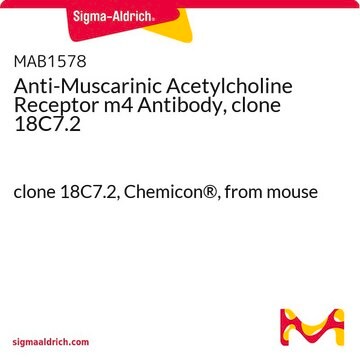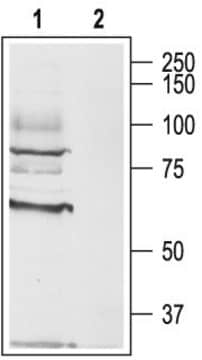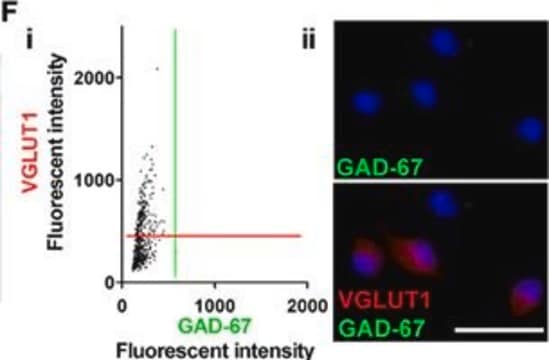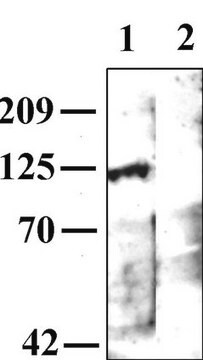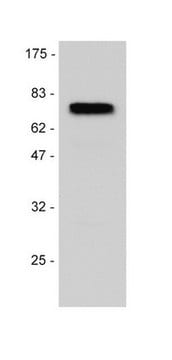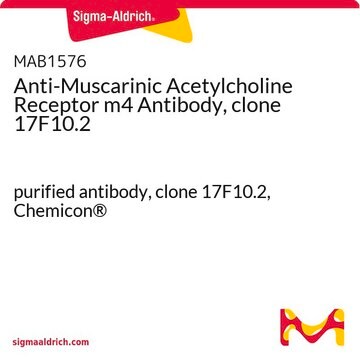MAB367
Anti-Muscarinic Acetylcholine Receptor m2 Antibody, clone M2-2-B3
clone M2-2-B3, Chemicon®, from rat
Synonym(s):
Muscarinic Receptor Antibody
About This Item
IHC
IP
immunohistochemistry: suitable
immunoprecipitation (IP): suitable
Recommended Products
biological source
rat
Quality Level
antibody form
purified immunoglobulin
antibody product type
primary antibodies
clone
M2-2-B3, monoclonal
species reactivity
human, monkey, rat
species reactivity (predicted by homology)
mammals
manufacturer/tradename
Chemicon®
technique(s)
immunocytochemistry: suitable
immunohistochemistry: suitable
immunoprecipitation (IP): suitable
isotype
IgG2a
suitability
not suitable for immunohistochemistry (Paraffin)
NCBI accession no.
UniProt accession no.
shipped in
wet ice
target post-translational modification
unmodified
Gene Information
human ... CHRM2(1129)
Specificity
SPECIES REACTIVITIES:
Expected to react with most mammalian species.
Immunogen
Application
Immunoprecipitation Works poorly for immunoblotting Optimal working dilutions must be determined by end user.
IMMUNOHISTOCHEMISTRY PROTOCOL FOR MAB367
This antibody has been used successfully on 30 mm, free floating, 4% paraformaldehyde fixed rat brain tissue. All steps are performed under constant agitation. Suggested protocol follows.
1) 3 x 10 minute washes in TBS (with or without 0.25% Triton).
2) Incubate for 30 minutes in TBS with 3% serum (same as host from secondary antibody).
3) Incubate primary antibody diluted appropriately in TBS with 1% serum (same as host from secondary antibody) (with or without 0.25% Triton) for 2 hours at room temperature followed by 16 hours at 4°C.
4) 3 x 10 minute washes in TBS.
5) Incubate with secondary antibody diluted appropriately in TBS with 1% serum (same as host from secondary antibody).
6) 3 x 10 minute washes in TBS.
7) ABC Elite (1:200 Vector Labs) in TBS.
8) 2 x 10 minute washes in TBS.
9) 1 x 10 minute wash in phosphate buffer (no saline).
10) DAB reaction with 0.06% NiCl added for intensification.
11) 2 x 10 minute washes in PBS.
12) 1 x 10 minute wash in phosphate buffer (no saline).
Neuroscience
Neurotransmitters & Receptors
Physical form
Storage and Stability
Other Notes
Legal Information
Disclaimer
Not finding the right product?
Try our Product Selector Tool.
Storage Class Code
10 - Combustible liquids
WGK
WGK 2
Flash Point(F)
Not applicable
Flash Point(C)
Not applicable
Certificates of Analysis (COA)
Search for Certificates of Analysis (COA) by entering the products Lot/Batch Number. Lot and Batch Numbers can be found on a product’s label following the words ‘Lot’ or ‘Batch’.
Already Own This Product?
Find documentation for the products that you have recently purchased in the Document Library.
Our team of scientists has experience in all areas of research including Life Science, Material Science, Chemical Synthesis, Chromatography, Analytical and many others.
Contact Technical Service